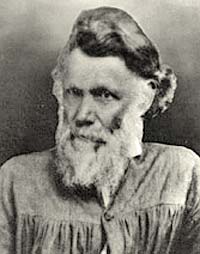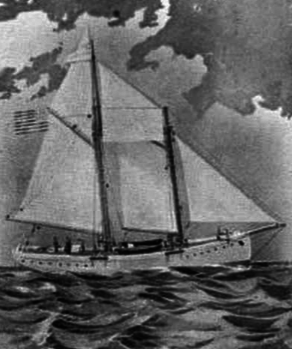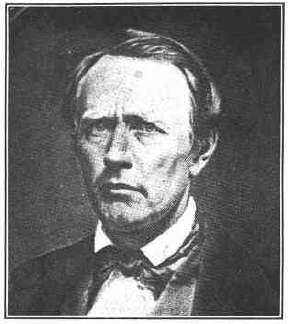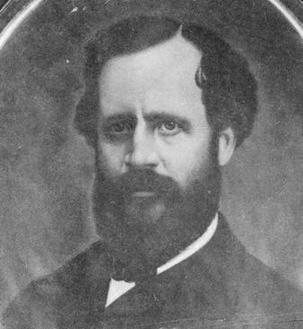Related Research Articles

Joseph Goff Gale was an American pioneer, trapper, entrepreneur, and politician who contributed to the early settlement of the Oregon Country. There he assisted in the construction of the first sailing vessel built in what would become the state of Oregon, sailed the ship to California to trade for cattle, and later served as one of three co-executives ("governors") in the Provisional Government of Oregon. Originally a sailor, he also spent time in the fur trade, as a farmer, and a gold miner in the California Gold Rush.

The Champoeg Meetings were the first attempts at formal governance by European-American and French Canadian pioneers in the Oregon Country on the Pacific Northwest coast of North America. Between 1841 and 1843, a series of public councils was held at Champoeg, a settlement on the French Prairie of the Willamette River valley in present-day Marion County, Oregon, and at surrounding settlements. The meetings were organized by newly arrived settlers as well as Protestant missionaries from the Methodist Mission and Catholic Jesuit priests from Canada.
Alanson Beers was an American pioneer and politician in the early days of the settlement of the Oregon Country. A blacksmith by trade, he was a reinforcement for the Methodist Mission in what would become the state of Oregon. The Connecticut native helped found the Oregon Institute and participated in the Champoeg Meetings where he was elected to serve on the Executive Committee in 1843.

The Star of Oregon was a schooner sailing vessel of the mid-19th century used on the west coast of North America. It was the first American sailing ship built in what is now the U.S. state of Oregon. Pioneer settlers built the ship from 1840 to 1842 in order to sail it to California and exchange it for livestock. During World War II a Liberty ship was named the SS Star of Oregon in honor of the 19th century sailing vessel.
The Star of Oregon episode of American history began in 1840 and ended in 1843. This enterprise by pioneers in the Willamette Valley of present-day Oregon consisted of building a ship they named Star of Oregon and then sailing it to California in order to bring back cattle to Oregon Country. The group was led by Joseph Gale and received assistance from Captain Wilkes of the United States Navy prior to setting sail on the open ocean. These pioneers were able to procure nearly 4,000 head of cattle, sheep, and horses combined.
William J. Bailey was a British-born physician who migrated to the United States, where he became a pioneer and politician in the Oregon Country, particularly the Willamette Valley. Bailey participated in the Champoeg Meetings that led to the creation of a provisional government in Oregon. He was selected as a member of that government, first on the executive committee and later in the Provisional Legislature of Oregon.

Ira Leonard Babcock was an American pioneer and doctor in the Oregon Country. A native of New York, he was selected as the first Supreme Judge with probate powers in February 1841 in what would become the state of Oregon.
Webley John Hauxhurst Jr. was a pioneer in Oregon Country. He helped build the first grist mill in Oregon, participated in the Willamette Cattle Company, and was a participant at the Champoeg meeting where he voted for the creation of a provisional government.
Thomas Jefferson Hubbard was an Oregon pioneer and politician who was acquitted of murder charges in the first American murder trial in what is now the state of Oregon. At the trial the murder was determined to be justifiable homicide.

William Holden Willson was a pioneer of the U.S. state of Oregon and the founder of its capital city, Salem. A native of New Hampshire, he immigrated to the Oregon Country in 1837 to work at the Methodist Mission, and there would participate in the Champoeg Meetings. Willson served as the first treasurer of the Provisional Government of Oregon.

The Provisional Legislature of Oregon was the single-chamber legislative body of the Provisional Government of Oregon. It served the Oregon Country of the Pacific Northwest of North America from 1843 until early 1849 at a time when no country had sovereignty over the region. This democratically elected legislature became the Oregon Territorial Legislature when the territorial authorities arrived after the creation of the Oregon Territory by the United States in 1848. The body was first termed the Legislative Committee and later renamed the House of Representatives. Over the course of its six-year history the legislature passed laws, including taxation and liquor regulation, and created an army to deal with conflicts with Native Americans.

Robert "Doc" Newell was an American politician and fur trapper in the Oregon Country. He was a frontier doctor in what would become the U.S. state of Oregon. A native of Ohio, he served in the Provisional Government of Oregon and later was a member of the Oregon State Legislature. The Newell House Museum, his reconstructed former home on the French Prairie in Champoeg, is listed on the National Register of Historic Places.

Reverend Josiah Lamberson Parrish was an American missionary in the Pacific Northwest and trustee of the Oregon Institute at its founding. A native of New York, he also participated in the Champoeg Meetings that led to the formation of the Provisional Government of Oregon in 1843. Parrish was married three times and was the first breeder of pure-bred sheep in Oregon.

George Kirby Gay was an English sailor and later settler in the Oregon Country. He was a member of the Willamette Cattle Company that brought livestock to Oregon and built the first brick house in the United States west of the Rocky Mountains. Gay also participated in the Champoeg Meetings that created a provisional government in what would become the U.S. state of Oregon.
The Peoria Party was a group of men from Peoria in the U.S. state of Illinois, who set out about May 1, 1839, with the intention to colonize the Oregon Country on behalf of the United States and to drive out the English fur-trading companies operating there. The men of the Peoria Party were among the early pioneers who used the Oregon Trail.

Francis Fletcher was a prominent pioneer of the U.S. state of Oregon and a member of the Peoria Party.
James A. O’Neil was an American businessman and politician in the Oregon Country and later Oregon Territory. A New York native, he took part in the Champoeg Meetings and helped form the Provisional Government of Oregon. Prior to the formation of a government he participated in the Willamette Cattle Company, and later served as a judge in the Provisional Government.

Medorem Crawford was an American soldier and politician in what became the state of Oregon. A native of the state of New York, he emigrated to the Oregon Country in 1842 where he participated in the Champoeg Meetings and served in the resulting Provisional Government of Oregon as a legislator. A Republican, he later served in the Oregon House of Representatives after statehood and was appointed to several federal government offices. During the American Civil War he escorted emigrants over the Oregon Trail.

Alvin Thompson Smith was an American missionary and politician in what became the state of Oregon. A native of Connecticut, he lived in Illinois before moving to the Oregon Country to preach to the Native Americans in the Tualatin Valley. There he served in both the Provisional Government of Oregon and the government of the Oregon Territory, as well as helping to establish Tualatin Academy, later becoming Pacific University. Smith's former home, the Alvin T. Smith House in Forest Grove, is listed on the National Register of Historic Places.
Felix Hathaway was an American carpenter and pioneer in what became the state of Oregon. A native of New England, he settled in the Oregon Country where he helped construct the first American-built ship in what became the state of Oregon. His home was used for the first meeting of the Provisional Legislature of Oregon in 1844.
References
- 1 2 3 4 5 6 7 Corning, Howard M. Dictionary of Oregon History. Binfords & Mort Publishing, 1956.
- 1 2 3 Collins, Dean (1943). Stars of Oregon. Binford & Mort.
- ↑ "Jackson County Place Names Database". Jackson County Genealogy Library. Archived from the original on 4 October 2018. Retrieved 29 May 2019.